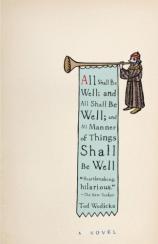All Shall Be Well; and All Shall Be Well; and All Manner of Things Shall Be Well
Review
All Shall Be Well; and All Shall Be Well; and All Manner of Things Shall Be Well
Kooky, quirky characters are fun to read. But they often fade
away when the book ends unless there is a real solidity underneath
any absurdity. It is not easy to write a character who is at once
silly and dead serious, and even more difficult to place that
character in a suitable tale. First-time novelist Tod Wodicka,
however, has done just that. In the memorably titled ALL SHALL BE
WELL; AND ALL SHALL BE WELL; AND ALL MANNER OF THINGS SHALL BE
WELL, readers meet Burt Hecker, a widowed eccentric who lives as if
it is 1105 and not 2008.
Years ago Burt founded the Confraternity of Times Lost Regained,
which allowed him not only to live out his medieval fantasies but
to do so with like-minded people. His friends and family put up
with his eccentricities, understanding them as harmless for the
most part. Only his mother-in-law, the stern Lemko nationalist Anna
Bibko, called it ridiculous. His daughter, June, rebelled through
an interest in science fiction and geology, but Burt's sensitive
son Tristan, a natural musician, joined his father in the world of
medieval reenactment.
However, since his wife's death from cancer two years ago, Burt has
loosened his already-tenuous hold on reality. He can no longer
maintain the family's Victorian bed and breakfast, spends his days
dressed in dirty tunics drinking mead and is estranged from his two
adult children. After absconding with his friend's car (which he
did not know how to drive), he is sentenced to an anger management
treatment. The group he ends up in is a women's medieval chant
workshop led by the sympathetic Tivona Henry. Tivona takes the
group to Germany for a conference on Hildegard von Bingen, a
medieval mystic and composer to whom Burt relates on a deeply
personal level. The trip to Europe provides an escape from the
scene of his wife's death and the opportunity to track down
Tristan, who, it turns out, is somewhere in Prague. Facing head-on
Burt's depression and drinking problem as well as family secrets
and dysfunction, the Heckers must decide if they can be a family
again and what family really means.
Wodicka's debut is original and highly readable but provides no
easy answers. Readers will surely come to care for the egocentric
and damaged Burt and his grieving family. Still, the author never
promises that all shall be well for them. In this way, the book is
at once inventive and realistic. This is a very confident first
novel; the characters are complex, the story is rich and the
settings are lively --- and all of it is written with a smart and
graceful hand.
ALL SHALL BE WELL succeeds in marrying the offbeat with the
commonplace. Moving effortlessly between past and present, Wodicka
tells the compelling story of a man at once both simple and quite
complicated. While the details of Burt Hecker's life are unique,
his tale --- of origins, destinations and the path between the two
--- is universal.
Reviewed by Sarah Rachel Egelman on December 22, 2010
All Shall Be Well; and All Shall Be Well; and All Manner of Things Shall Be Well
- Publication Date: January 6, 2009
- Genres: Fiction
- Paperback: 272 pages
- Publisher: Vintage
- ISBN-10: 0307278875
- ISBN-13: 9780307278876




